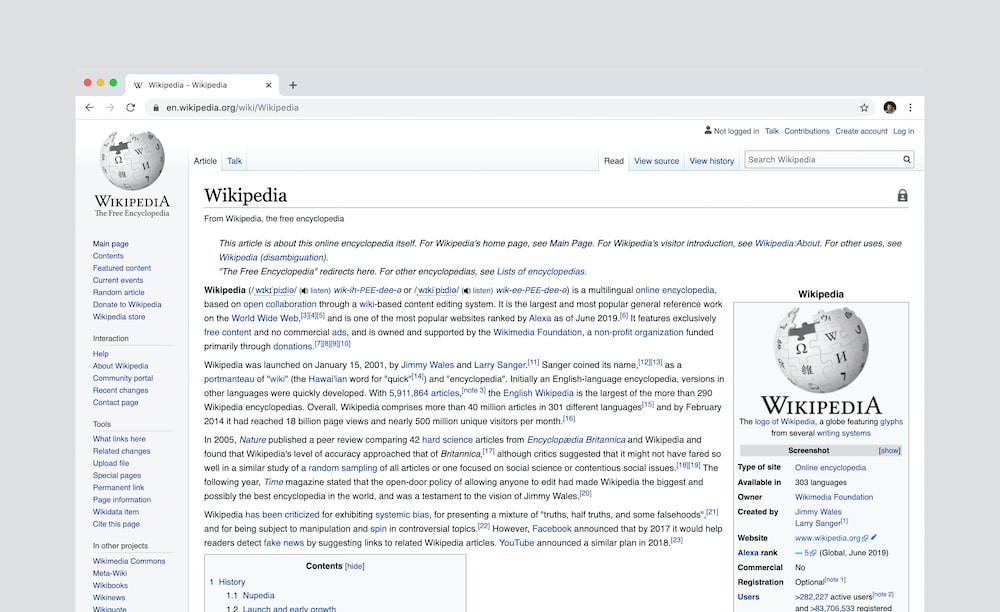Table Of Content
Know About the Types of Professional Websites That are Used for Company Branding
Having a website nowadays is essential if you want to ensure that you have a digital presence. Social media may be a great tool for exposure, but it is websites that offer a feeling of trustworthiness and build authority. But what types of websites can you use to represent your brand?
Now, different website types and purposes are leveraged by brands around the world to portray the type of digital image they want to portray. For example, a new game or software might rely on building an online forum alongside their business website, in order to build an online community for their product.
However, you need to have a right kind of web application hosted on a secure website hosting platform to exhibit a strong impact. Moreover, the visual layout and navigation are also an important factor, according to Adobe, and play a huge role in how popular a site is among consumers.
So, let’s look at the top website categories, and how brands can use them to their advantage.
Types of Business Websites
A business website is a company’s online identity. No matter the type or nature of your business, a website can be of great benefit to you. Today, you will see many brands and businesses, from consulting firms to manufacturing companies and startups, having a website online defining their offerings.
To put it simply, a website allows you establish a base of trust among potential consumers, especially today where a large population of the word has instant access to the internet. And it doesn’t have to be too fancy either. Even simple websites can do the job, when developed well.
Imagine that you’re looking for a new car, and are looking for dealers in your area offering the best price. Suddenly, you come across a website advertising for a local car dealer offering a limited time deals on select models. Now, you are excited, but are wary of it too, because, let’s face it, you saw the ad on social media. So what are you to do now?
You look up the dealership online, and find out that they have a website, which incidentally also feature reviews from past customers. Convinced that the dealership is generally we’ll-reviewed, you decide to trust and visit them, and end up buying your desired car at the dealership.
This example is a great example of how business websites can help both the business and potential customers connect, being a win-win solution for everyone.
Types of eCommerce Websites

Ecommerce is a popular mode of business today for many brands, who prefer selling products via their own website rather than through a dealer or third-party site. Basically, it’s a basic retail method, only done online.
So, why do these brands need an online store built from an advanced website builder when they already have brick-and-mortar stores available. Well, for one, it allows more people access to shop at these brands. By allowing those who do not have the time, or live far from the physical store, to order products via the ecommerce store, thus increasing revenue for the brands.
Moreover, many brands are now moving away from physical storefronts in favor of online stores. And that is simply due to the costs associated with both. Physical stores cost a lot more than online stores, and are able to deal with a limited number of customers in a day. An online store built using a powerful website CMS can deal with a far larger magnitude of customers, making it more effective for the business.
Similarly, an online store can offer a larger variety and quantity of inventory, unlike a physical store that is often limited in the amount of inventory they can store. Therefore, if your company sells products, then an ecommerce site is the best option for you to keep track of the website analytics. And as these types of online marketplace websites are becoming more and more common, many web developers have become quite adept at making robust ecommerce sites using advanced software development standards.
Types of Portfolio Websites
A portfolio website, like the name suggests, is designed to showcase your professional portfolio. For many professionals, the quality of their past deliverables plays a huge part in attracting and converting new customers. The list includes writers, graphic designers, animators, UI/UX designers, and more.
And as the site is created to portray the portfolio, the focus of the website design is on the elements of the portfolio itself. Hi-res images, snippets from published articles, short animations, and other such content is what you’ll generally see displayed right at a portfolio site’s homepage.
Essentially, portfolio sites are more focused on showing the results of your work, rather than explaining your services or describing you. However, adding your contact info is a given, as well as a short bio, so that potential customers can look you up and verify your authenticity.
Portfolio websites often require the help of a web developer who is not only skilled in UX design basics, but also understands the specifics of website management. Only then will they be able to develop a site that would display your prowess effectively.
Types of Personal Websites

Personal websites are sites that represent a specific person, such as a life coach, a movie star, or even a famous consultant. Its primary purpose is to give your online presence a touch of authenticity, thus boosting your impact as a brand. Take Neil Patel’s website for example. Starting from the domain name itself, it is the perfect example of building a personal branding website.
However, it isn’t always about building a personal brand. Sometimes, people just want to show themselves in the best possible light, different and refreshingly unorthodox. An example of that is a CV website, whose purpose is to showcase someone’s professional achievements.
Now, some may say that personal websites are the same as portfolio websites, and to some extent, they might be right. But for the most part, there is a distinct difference. Unlike portfolio websites, a personal website does not solely focus on the visuals, but tends to highlight the person themselves. And it is that same factor that can make continuous website optimization an important way to stand out in a highly competitive market.
Types of Non-Profit Websites
A nonprofit website is a website that showcases and explains the mission and goal of your organization.
Many nonprofit organizations representing humanitarian efforts like access to clean water, food, healthcare, and more have a website designed to attract donors while showcasing their work. Their websites are an important asset for them, and often provide a medium for them to explain the importance of their cause as well as their efforts in that regard.
Being developed with a proper software quality assurance test, these websites are often designed for a specific purpose. Mostly they are designed to get their message out to the masses, and also provides a way for people like new members and donors to contact the organization. Moreover, it also gives your nonprofit a sense of legitimacy, which is perfect if you are looking for donations.
Types of Educational Websites

Informational websites like Wikipedia are a great online resource to learn about a topic in detail. These sites often have a simpler design, and are created to be light and quick to load. Their purpose is simply to educate and inform the people about a topic in detail, which often entails building a lot of pages to accommodate all the information successfully.
These database-like websites can be considered online encyclopedias for people looking for specific information about a topic. These topics are all arranged on separate pages, making it easy to find the exact topic a user searches for.
From a website development perspective, these sites are no easy task to develop. And it takes a lot of skill and effort to implement just the functional requirements successfully, making it an ongoing project in terms of development. Moreover, the amount of work required to keep such a site up and running requires a large team of experts who work hard to identify and resolve any issues that rise up.
Types of Blogging Websites

Blog sites are websites that are designed to show written or visual content for its audience. Blogs sites either publish articles of a similar theme, or in the case of personal blogs, whatever fancies the writer. Many people use blog sites as a way of generating extra income by displaying ads, promoting specific products, or by using affiliate links.
Some of the most common types of blogs include food blogs, travel blogs, lifestyle/influencer blogs, and even vlogs. Initially though, blogging was designed to be an outlet for the creatives. In fact, it was designed for anyone who had a voice, and wanted others to hear about it.
However, today, blogging has become a lucrative marketing tools for businesses. According to recent stats, nearly 90% of businesses use blogging within their content marketing strategies, in order to attract leads organically.
From a developers’ perspective, blogging sites are some of the easiest websites to develop. In fact, many people do not even hire designers to create a blog for themselves, and use a site builder like Wix to create one for themselves. However, that often leads to sites that aren’t just generic, but can be considered borderline bad website design examples to avoid.
Types of Social Networking Websites
Now, considering the huge popularity of platforms like Facebook, Twitter, Instagram and more others, it is quite easy to understand why social networking has advanced quite rapidly in the world. Today, everyone loves to interact with different people through social networking websites. It provides them a perfect gateway to share and see different things that people are putting on online social websites.
If we look back at the history of social networking websites, we will find few pioneering names like Orkut, MySpace and more in the list. These social websites were the first to hit the market, offering people a new perspective to share their stuff casually on the internet. Later on, with the arrival of bigger platforms like Facebook, LinkedIn and more, the trend saw an immersive rise with more players joining the race. Today, there are tons of social networking websites available around and people simply love to use them in their free time.
Choosing the Right Types of Web Applications for Your Brand
Choosing the right types of websites is as easy as understanding your business objectives. By understanding what you are hoping to accomplish from the website, you will be able to make the right decision regarding what type of website would be perfect for your business.
For example, a retail business who wants to sell more items, but develops a business website instead of an ecommerce store, will not have the desired impact. instead, they will have wasted their resources on building the wrong kind of website, especially when their business already needed a boost in revenue.
FAQs
| 1. What are the different types of websites? There are different types of websites used by the businesses to showcase their products and core branding identity. It includes different websites such as portfolio, ecommerce, business, blogging and more other websites. |
| 2. What are the most popular types of websites? Considering the traffic and usage, ecommerce websites are quite popular in the market. However, blogging websites are also very much famous, as they receive huge chunk of web traffic everyday. |
| 3. What are the different types of web designs? Based on the given requirements, developers create different kinds of web designs. It includes boxed shape, content-heavy design, interactive UI layout and more others. |
| 4. What are the different types of web hosting services? During the last few years, web hosting services have also evolved quite a lot. Today, you can find a variety of web hosting services operational in the market including cloud hosting, managed web hosting and more others. |
| 5. What types of websites are used for e-commerce? For ecommerce, websites featuring different products are used to grab customers attention. These websites have become quite common and are used by majority of ecommerce companies these days. |
| 6. What types of websites are suitable for blogging? For blogging, you can use CMS based websites to easily write and publish different articles. Some of the popular CMS systems used these days include WordPress, Drupal, Webflow and more others. |
| 7. What types of websites are used for social networking? The websites that are used for social networking are generally called social media websites. They are created with different features that help users to post, like, comment and share different things easily. |
| 8. What types of websites are used for online communities? For online communities, forums are proffered more to engage everyone in the discussion. These are proper communication platforms where members can easily ask questions and give answers to different queries by engaging in a relevant thread. |
| 9. What are the different types of web development languages? To create websites, developers use different types of languages. Some of the popular names among them includes PHP, Python, Java, and more others. |
| 10. How can I create my own educational website? In order to create an eLearning website, you need to follow the steps given below: – Register your desired domain name – Hire a web developer to create your website, or go for a site builder like Wix or Squarespace – Get a basic hosting package – Choose your desired theme, and make the necessary edits using the site builder – Publish it, and you are done. |
Conclusion
In short, the right types of websites built at the right time will help your business stand out and succeed as desired. However, if you fail to understand what type of website would be perfect for your business’s growth, then chances are you will end up wasting those precious resources to develop a website that won’t be able to help your business explode.
So, if looking to find out what website example can help your business grow, then you are in the right place.
